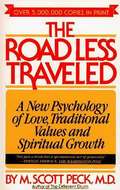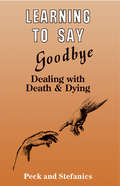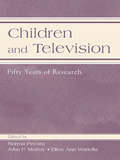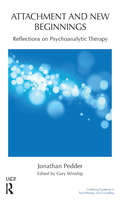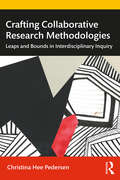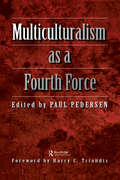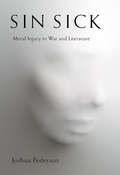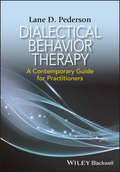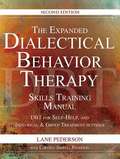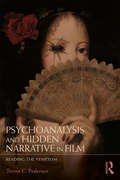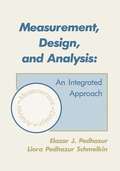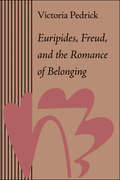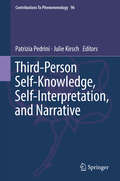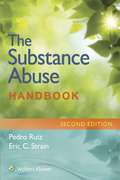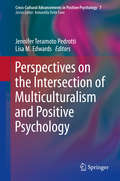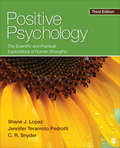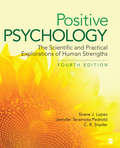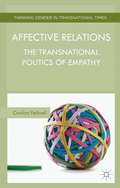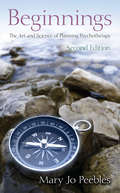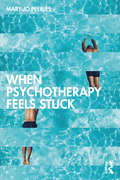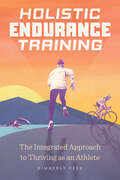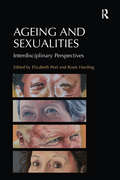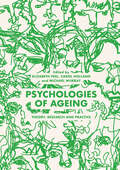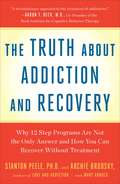- Table View
- List View
The Road Less Traveled: A New Psychology of Love, Traditional Values, and Spiritual Growth
by M. Scott PeckWays in which confronting and resolving our problems, and suffering through the changes, can enable us to reach a higher level of self-understanding.
Learning To Say Goodbye: Dealing With Death And Dying
by Rosalie Peck Charlotte StefanicsFirst published in 1987. Routledge is an imprint of Taylor & Francis, an informa company.
Children and Television: Fifty Years of Research (Routledge Communication Series)
by Norma Pecora John P. Murray Ellen Ann WartellaThis seminal volume is a comprehensive review of the literature on children's television, covering fifty years of academic research on children and television. The work includes studies of content, effects, and policy, and offers research conducted by social scientists and cultural studies scholars. The research questions represented here consider the content of programming, children's responses to television, regulation concerning children's television policies, issues of advertising, and concerns about sex and race stereotyping, often voicing concerns that children's entertainment be held to a higher standard. The volume also offers essays by scholars who have been seeking answers to some of the most critical questions addressed by this research. It represents the interdisciplinary nature of research on children and television, and draws on many academic traditions, including communication studies, psychology, sociology, education, economics, and medicine. The full bibliography is included on CD.Arguably the most comprehensive bibliography of research on children and television, this work illustrates the ongoing evolution of scholarship in this area, and establishes how it informs or changes public policy, as well as defining its role in shaping a future agenda. The volume will be a required resource for scholars, researchers, and policy makers concerned with issues of children and television, media policy, media literacy and education, and family studies.
Attachment and New Beginnings: Reflections on Psychoanalytic Therapy (The\united Kingdom Council For Psychotherapy Ser.)
by Jonathan PedderThis collection of written pieces plots the work of an NHS psychotherapist, Jonathan Pedder, turning the science of psychiatry into human encounters. He had a career teaching and inspiring colleagues and students with psychoanalytic ways of thinking, encouraging and supporting them in the challenges of contemporary psychiatry. In his work he made the world of psychoanalysis accessible to non-analysts, and this book augments the textbook on psychotherapy which Pedder wrote with Dennis Brown. Pedder was a quiet visionary influential in offering a pathway for mental health workers from many disciplines to find their way to the psychoanalytic ideas that illuminate their patients/clients.'- Professor R. D. Hinshelwood, Author of Clinical Klein and Dictionary of Kleinian Thought.
Crafting Collaborative Research Methodologies: Leaps and Bounds in Interdisciplinary Inquiry
by Christina Hee PedersenCrafting Collaborative Research Methodologies demonstrates a number of collaborative, visual and narrative methods that explore the promises and the ethical, relational complexities inherent in collaborative research. It engages with both the potentials and complexities of doing collaborative analysis and offers a medley of methods for analysis. These methods revolve around co-produced texts from Peru, Denmark and Bolivia, and involve images, memory work and practical approaches to intersectionality thinking. Through detailed explorations of the complex interweaving of issues of meaning-making, difference and the co-production of knowledges, dynamics of social exclusion and segregation become visible in the nexus between evocation and interpretation. Christina Hee Pedersen takes up the poststructuralist challenge of including researcher subjectivity as part of the analysis and, through a lively writing style, the reader is invited to engage in this analysis of the performativity of selves. This book can inspire analytical thinking for researchers and advanced students interested in expanding the rich dialogues among feminists doing poststructuralist and interdisciplinary inquiry, and for all students of qualitative and collaborative methodologies.
Multiculturalism as a fourth force
by Paul PedersenFirst published in 1999. Routledge is an imprint of Taylor & Francis, an informa company.
Sin Sick: Moral Injury in War and Literature
by Joshua PedersonIn Sin Sick, Joshua Pederson draws on the latest research about identifying and treating the pain of perpetration to advance and deploy a literary theory of moral injury that addresses fictional representations of the mental anguish of those who have injured or killed others. Pederson's work foregrounds moral injury, a recent psychological concept distinct from trauma that is used to describe the psychic wounds suffered by those who breach their own deeply held ethical principles.Complementing writings on trauma theory that posit the textual manifestation of trauma as absence, Sin Sick draws argues that moral injury appears in literature in a variety of forms of excess. Pederson closely reads works by Dostoevsky (Crime and Punishment), Camus (The Fall), and veterans of the wars in Iraq and Afghanistan (Brian Turner's Here, Bullet; Kevin Powers' The Yellow Birds; Phil Klay's Redeployment; and Roy Scranton's War Porn), contending that recognizing and understanding the suffering of perpetrators, without condoning their crimes, enriches the experience of reading—and of being human.
Dialectical Behavior Therapy
by Lane D. PedersonA definitive new text for understanding and applying Dialectical Behavior Therapy (DBT). Offers evidence-based yet flexible approaches to integrating DBT into practice Goes beyond adherence to standard DBT and diagnosis-based treatment of individuals Emphasizes positivity and the importance of the client's own voice in assessing change Discusses methods of monitoring outcomes in practice and making them clinically relevant Lane Pederson is a leader in the drive to integrate DBT with other therapeutic approaches
The Expanded Dialectical Behavior Therapy Skills Training Manual: DBT for Self-Help and Individual & Group Treatment Settings (Second Edition)
by Lane Pederson Cortney Sidwell PedersonThis second edition is the most comprehensive and readable DBT manual available with more skills than any other DBT book on the market. <p><p> Beyond updates to the classic skills modules, clients and therapists will be enriched by added modules that include Dialectics, Cognitive Modification, Problem-Solving, and Building Routines as well as all-new, much-needed modules on Addictions and Social Media. <p> Designed for DBT therapists, eclectic and integrative therapists, and as a self-help guide for people interested in learning DBT skills, the straightforward explanations and useful worksheets contained within make DBT skills learning and practice accessible and practical for both skills groups and individual users.
Psychoanalysis and Hidden Narrative in Film: Reading the Symptom
by Trevor C. PedersonPsychoanalysis and Hidden Narrative in Film proposes a way of constructing hidden psychological narratives of popular film and novels. Instead of offering interpretations of classic films, Trevor C. Pederson recognizes that the psychoanalytic tradition began with making sense of the seemingly inconsequential. Here he turns his attention to popular films like Joel Schumacher's The Lost Boys (1987). While masterworks like Psycho (1960) are not the object of interpretation, Hitchcock’s film is used as a skeleton key. The revelation that Norman Bates’ character had been his mother all along, suggests a framework of reading a film as having symptom characters who are excised to create a latent plot. The symptom character's behavior or inter-relations are then transcribed to an ego character. This is a shift in the tradition of literary doubling from hermeneutic intuition to a formal methodology that generates data for the unconscious. Pederson continues the project of unifying competing schools into a single model of mind and offers clinical examples from his own practice for all its terms. Psychodynamic techniques that emphasize the importance of working with the body, the id, and the ubiquity of repetition are introduced. A return to Freud’s structural theory, in which complexes are anchored in the stages of superego development, is used to carefully plot and explain the social nature of the superego and its relation to authority in society (secondary narcissism) and the otherworldly (primary narcissism). Discrete phases of superego development and their ties to both the social and the id revive the grand promises of classical psychoanalysis to link with every field in the humanities. Psychoanalysis and Hidden Narrative in Film will appeal to psychoanalysts and psychoanalytic psychotherapists as well as scholars of film studies and literature interested in using a psychoanalytic approach and ideas in their work.
Measurement, Design, and Analysis: An Integrated Approach (Psychology Press And Routledge Classic Editions Ser.)
by Elazar J. Pedhazur Liora Pedhazur SchmelkinIn textbooks and courses in statistics, substantive and measurement issues are rarely, if at all, considered. Similarly, textbooks and courses in measurement virtually ignore design and analytic questions, and research design textbooks and courses pay little attention to analytic and measurement issues. This fragmentary approach fosters a lack of appreciation of the interrelations and interdependencies among the various aspects of the research endeavor. Pedhazur and Schmelkin's goal is to help readers become proficient in these aspects of research and their interrelationships, and to use that information in a more integrated manner. The authors offer extensive commentaries on inputs and outputs of computer programs in the context of the topics presented. Both the organization of the book and the style of presentation allow for much flexibility in choice, sequence, and degree of sophistication with which topics are dealt.
Euripides, Freud, and the Romance of Belonging
by Victoria PedrickFreud's interpretation of the ancient legend of Oedipus—as formulated in Sophocles' tragic drama—is among the most widely known concepts of psychoanalysis. Euripides' Ion, however, presents a more complex version of the development of personal identity. Here, the discovery of family origins is a process in which parent and child both take part as distinct agents driven by their own impulses of violence and desire.Euripides, Freud, and the Romance of Belonging studies the construction of identity and the origins of the primal trauma in two texts, the Ion and Freud’s case history of the Wolf Man. Victoria Pedrick challenges the conventional psychoanalytic theory of the development of the individual within the family, presenting instead a richer and more complex economy of exchange between the parent and the child. She provides a new perspective on Freud's appropriation of ancient texts and moves beyond the familiar reunion in Oedipus to the more nuanced scene of abandonment present in Ion. Her parallel investigation of these texts suggests that contemporary culture remains preoccupied by the problems of the past in the determination of identity.Pedrick's fresh perspectives on both texts as well as on their relationship to each other shed new light on two foundational moments in the intellectual development of the West: Greek tragedy and Freudian psychoanalysis.
Third-Person Self-Knowledge, Self-Interpretation, and Narrative (Contributions To Phenomenology #96)
by Patrizia Pedrini Julie KirschThis volume answers questions that lead to a clearer picture of third-person self- knowledge, the self-interpretation it embeds, and its narrative structure. Bringing together current research on third-person self-knowledge and self-interpretation, the book focuses on third-person self-knowledge, and the role that narrative and interpretation play in acquiring it. It regards the third-personal epistemic approach to oneself as a problem worthy of investigation in its own right, and makes clear the relation between third-person self-knowledge, self-interpretation, and narrative capacities. In recent years, the idea that each person is in a privileged position to acquire knowledge about her own mental states has come under attack. A growing body of empirical research has cast doubt upon the existence of what philosophers call ‘first person self-knowledge’, i.e., knowledge about our mental states that is often thought to be immediate, transparent, and authoritative. This line of thought has led some philosophers to claim that what seems to be ‘first-person self-knowledge’ is really just ‘third-person self-knowledge,’ i.e., knowledge about our mental states that is inferential, opaque, and fallible. This book discusses challenges for first-person knowledge and explores the true nature of third-person knowledge.
The Substance Abuse Handbook
by Pedro Ruiz; Eric C. StrainStay up to date with the latest substance abuse treatments and modes of intervention with The Substance Abuse Handbook, 2e. The editors are both nationally recognized clinicians, and provide authoritative, clinically oriented information on the subject of substance use, abuse, and dependence, with an emphasis on diagnosis, treatment, and prevention.
Perspectives on the Intersection of Multiculturalism and Positive Psychology
by Jennifer Teramoto Pedrotti Lisa M. EdwardsThe volume will be a collection of chapters about current theory, research, and practice related to multiculturalism and positive psychology. This book will serve as a reference to any who are interested in the intersection of positive psychology and multicultural context. While many in the field of positive psychology have begun to move more strongly towards a culturally-embedded approach that recognizes the importance of context in discussing, viewing and cultivating strengths in individuals from different backgrounds, there is still a dearth of research in this area compared with studies that take a cross-cultural approach (comparing people from different countries) or one that is purported to be "culture-free" or universal in its application. While it is becoming more common to see various articles or chapters published on these topics, there is still no comprehensive text aimed at discussion of the collection of these topics presented in a cohesive and structured way. This book aims to fill this gap in the literature. In this book, a broad definition of culture is utilized that includes such facets as race, ethnicity, socioeconomic or social class status, disability, religion, sexual orientation and gender. This book is intended to present research, theory and suggestions for practice that are grounded in diverse cultural contexts and current scholarship. It will assist researchers, students and practitioners who are studying and working within diverse populations. Currently there exists no comprehensive text that addresses the intersection of positive psychology and multiculturalism. Several edited volumes address positive psychology constructs (e. g. , well-being, optimal experience, autonomy) across cultures, but they do not focus on multicultural populations within the United States. Other books focus more specifically on mental health applications and stress and coping among multicultural populations, however these books do not provide a broad perspective on psychology beyond this application piece. The proposed book will review current theory and research about constructs in addition to applications across contexts. Finally, other published books have focused on youth within multicultural society; this volume is more broad in its address of issues of positive psychology across the lifespan and across various aspects of identity including disability, gender, social class and sexual orientation.
Positive Psychology: The Scientific and Practical Explorations of Human Strengths (Praeger Perspectives Ser.)
by Jennifer Teramoto Pedrotti Dr Shane J. Lopez Charles Richard SnyderThe fully updated Third Edition of Positive Psychology: The Scientific and Practical Explorations of Human Strengths covers the science and application of positive psychology and presents new frameworks for understanding positive emotions and strengths through a culturally competent lens. Authors Shane J. Lopez, Jennifer Teramoto Pedrotti, and C.R. Snyder bring positive psychology to life by addressing important issues such as how positive psychology can improve schooling and the workplace, as well as how it can promote flourishing in day-to-day life. Throughout the book, well-crafted exercises allow readers to apply major principles to their own lives. The book also explores various positive conditions within multiple cultural contexts, such as happiness and well-being, and processes related to mindfulness, wisdom, courage, and spirituality. “The emphasis is not exclusively clinical; it includes applications and implications across a number of environments and draws from a number of perspectives, including neurobiology. This range makes it an excellent choice for anchoring major concepts so students can explore the application of positive psychology to their specific areas of interest.” —Dr. Pamela Rutledge, Massachusetts School of Professional Psychology
Positive Psychology: The Scientific and Practical Explorations of Human Strengths (Praeger Perspectives Ser. #7)
by Jennifer Teramoto Pedrotti Dr Shane J. Lopez Charles Richard SnyderPositive Psychology: The Scientific and Practical Explorations of Human Strengths comprehensively covers the science and application of positive psychology. Authors Shane J. Lopez, Jennifer Teramoto Pedrotti, and C. R. Snyder bring positive psychology to life by illustrating issues such as how psychological strength can help increase positive outcomes in school and the workplace and promote cooperative relationships among people. Furthermore, the book encourages readers to engage with concepts in order to understand positive emotions and strengths, such as empathy, altruism, gratitude, attachment, and love. Over 50 case studies grounded in practice, research, and the authors’ teaching experience reveal how positive psychological phenomena operate in the lives of real people.
Positive Psychology: The Scientific and Practical Explorations of Human Strengths (Praeger Perspectives Ser. #7)
by Jennifer Teramoto Pedrotti Dr Shane J. Lopez Charles Richard SnyderPositive Psychology: The Scientific and Practical Explorations of Human Strengths comprehensively covers the science and application of positive psychology. Authors Shane J. Lopez, Jennifer Teramoto Pedrotti, and C. R. Snyder bring positive psychology to life by illustrating issues such as how psychological strength can help increase positive outcomes in school and the workplace and promote cooperative relationships among people. Furthermore, the book encourages readers to engage with concepts in order to understand positive emotions and strengths, such as empathy, altruism, gratitude, attachment, and love. Over 50 case studies grounded in practice, research, and the authors’ teaching experience reveal how positive psychological phenomena operate in the lives of real people.
Affective Relations
by Carolyn PedwellExploring the ambivalent grammar of empathy where questions of geo-politics and social justice are at stake - in popular science, international development, postcolonial fiction, feminist and queer theory - this book addresses the critical implications of empathy's uneven effects. It offers a vital transnational perspective on the 'turn to affect'.
Beginnings, Second Edition: The Art and Science of Planning Psychotherapy
by Mary Jo PeeblesUtilizing a decade's worth of clinical experience gained since its original publication, Mary Jo Peebles builds and expands upon exquisitely demonstrated therapeutic approaches and strategies in this second edition of Beginnings. The essential question remains the same, however: How does a therapist begin psychotherapy? To address this delicate issue, she takes a thoughtful, step-by-step approach to the substance of those crucial first sessions, delineating both processes and potential pitfalls in such topics as establishing a therapeutic alliance, issues of trust, and history taking. Each chapter is revised and expanded to include the latest treatment research and modalities, liberally illustrated with rich case material, and espouse a commitment to the value of multiple theoretical perspectives. Frank and sophisticated, yet eminently accessible, this second edition will be an invaluable resource for educators, students, and seasoned practitioners of any therapeutic persuasion.
When Psychotherapy Feels Stuck
by Mary Jo PeeblesEvery therapist feels stuck at some point. Dr. Peebles offers ways of working with patients that clear openings for growth inside those stuck-places. When Psychotherapy Feels Stuck integrates wisdom from multiple theoretical schools. It balances explicit, systematized frameworks for thinking with sensory-based metaphors. Chapters interweave empirical research with clinical vignettes to describe the power of language choices, tolerating not-knowing, risking relationship, and creating meaning. Therapists from all theoretical backgrounds and experience levels will find something unexpected here that sparks hope and a fresh take when feeling stuck.
Holistic Endurance Training: The Integrated Approach to Thriving as an Athlete
by Kimberly PeekNutrition, mindset, and workout strategies—an integrative guide to endurance training Whether you're training for marathons, triathlons, ultras or anything in between, every endurance athlete should understand the lifestyle and training approaches that build athletic capacity—and protect it over time. Holistic Endurance Training is an in-depth guide to Responsive Endurance Training (RET) that will help you cultivate more energy and stamina while keeping injuries, strain, and burnout at bay. Coach and triathlete Kim Peek offers a detailed-yet-simple integrative approach to shaving seconds off your finishing times while thriving mentally and physically as a recreational or competitive athlete. This complete guide to endurance training includes: Training for your body right now—This self-study-driven training protocol helps you understand your unique requirements for achieving your best. Personal coach—Discover endurance-boosting meal-planning tips and exercise advice based on your individual capabilities. Backed by data—All the scientific background details have been transformed into actionable programs to help your performance. Learn how to improve your overall athletic performance with strategies and exercises that help you reach physical peaks you didn't know existed.
Ageing and Sexualities: Interdisciplinary Perspectives
by Elizabeth Peel Rosie HardingThis book showcases developments in theory, research and practice regarding sexuality and ageing, considering the differences as well as similarities between and among ageing heterosexual and LGBT older people. Identifying the questions central to future social scientific research on ageing and sexuality, it focuses on the important, emerging dimensions of sexuality and ageing: embodiment, the diversification of the ageing context and the intersections of care and sexuality. With attention to the different forms of sexualities, particularly at their intersection with gender, this volume explores the importance of spatial and relational contexts, whether individual, residential or virtual, with authors offering studies of online dating, sexuality in the context of residential care and the relationship between sexuality, legal frameworks and social policy. Interdisciplinary in scope and offering the latest research from scholars in the UK, Australasia and Africa, Ageing and Sexualities constitutes an integrated approach to the conceptual and practical challenges of understanding the interplay of ageing and sexuality in contemporary society. As such, it will appeal to scholars from a variety of disciplinary backgrounds, including sociology, cultural studies, socio-legal studies, social gerontology, psychology, medicine and health care.
Psychologies of Ageing: Theory, Research and Practice
by Elizabeth Peel Carol Holland Michael MurrayThis book brings together a diversity of perspectives on the psychology of ageing. Exploring theoretical, conceptual, empirical and practical viewpoints on the topic, the authors offer insight into a range of contemporary issues. Dedicated chapters discuss themes within social and critical psychology such as ageing identities, sexuality and empathy in palliative care. The second part of the book analyses cognitive and biological aspects of ageing, including stress and health in ageing, dementia and lifestyle, and resilience in frailty in old age. The authors conclude by offering perspectives on community and political psychology, examining home and community supports for older people. Written in an accessible style suitable for students as well as researchers in psychology and the social sciences interested in ageing, this book showcases key theoretical, empirical, and practical issues in later life.
Truth About Addiction and Recovery
by Stanton PeeleA radical new approach to recovery—using methods proven more effective than medical treatment or twelve-step programs.Drawing on the latest research and detailed case studies, the authors expose the best-kept secrets in the recovery field:· Addictions—whether to food, cigarettes, sex, alcohol, or drugs—are not diseases, and they’re not necessarily lifelong problems. · Many more people give up addictions on their own than are helped by medical treatment or twelve-step programs. · Developing values, skills, and life resources enables people to quit addictions—and to shed the addict identity altogether. In their revolutionary “Life Process Program” for overcoming all kinds of addictions, the authors emphasize self-help and treatment through coping with stress and achieving one’s goals. As helpful as it is controversial, The Truth About Addiction and Recovery will forever change the way we view and treat addiction. “A classic.” —John Norcross, PhD, ABPP, Distinguished Professor of Psychology at the University of Scranton and author of Changing for Good
